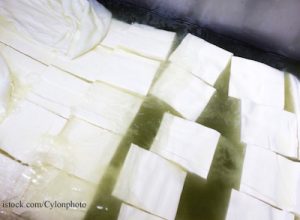The FDA sent a warning letter to Osage Lane Creamery in Pataskala, Ohio stating that they found Listeria monocytogenes in the facility. That creamery makes and sells raw goat milk Feta cheese, which is not pasteurized to destroy pathogens such as Listeria. Swabs taken from various areas in the processing area revealed the presence of the pathogenic bacteria.
 Listeria contamination in soft cheeses, particularly raw milk cheeses, can be a persistent problem. This bacteria can be very harmful, especially to those in high risk groups such as children, the elderly, those with compromised immune systems, and pregnant women.
Listeria contamination in soft cheeses, particularly raw milk cheeses, can be a persistent problem. This bacteria can be very harmful, especially to those in high risk groups such as children, the elderly, those with compromised immune systems, and pregnant women.
The discovery of the bacteria means that the food products are considered adulterated. The firm has “significant deviations” from the Current Good Manufacturing Practice regulation for foods, according to the FDA.
This is not the first time that FDA investigators found Listeria monocytogenes in this facility. The positive swab that triggered this warning letter was on the processing room floor, about two feet from the kettle used to heat ingredients to manufacture cheese. Listeria was found in the facility during inspections on May 21 and 22, 2015, June 15, 2015, and July 16-19, 2015.
And, during inspections in 2012, the FDA determined that two swabs tested positive for Listeria. The recurrent presence of Listeria in the facility is significant because it shows that sanitation efforts are “inadequate to effectively control pathogens in your facility to prevent contamination of food,” according to the letter.
In addition, FDA inspectors found other significant violations. An employee carried milk cans from the onsite goat barn to the processing room and placing the cans directly on the floor. The milk from those cans was poured into a kettle and placed back on the floor. Then a water hose was used to spray and rinse the cans and it touched the inside of the milk cans and was used to spray the inside of the kettle.
Inspectors also found standing water on the floor, dead insects and spiders on the walls and processing floor, and dirt and debris build-up on plastic storage buckets. Those buckets were used to catch whey from cheese draining in plastic molds.
Finally, the FDA observed that excessive humidity in the processing room caused condensate to form on the corrugated ceiling, including directly above exposed in-process feta cheese.





They don’t sound committed to safe cheese?